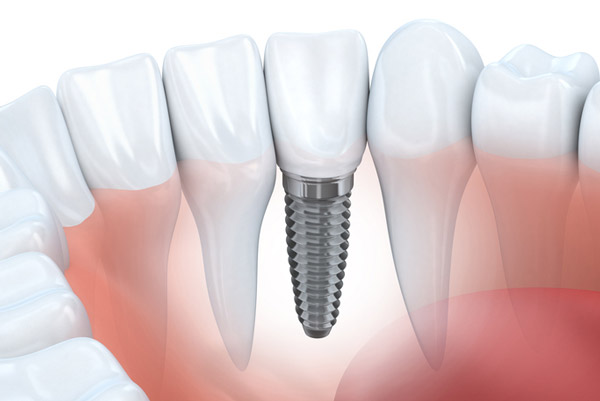Dental Implant FAQ
 Patients with missing teeth or teeth that are too damaged to be saved visit Columbia Implant Center for dental implants. Missing or weak teeth can cause difficulties with eating, speaking, and maintaining jawbone density, along with a decrease in self-confidence. Implants can help restore both function and aesthetics, and we are here to answer your frequently asked questions about dental implants.
Patients with missing teeth or teeth that are too damaged to be saved visit Columbia Implant Center for dental implants. Missing or weak teeth can cause difficulties with eating, speaking, and maintaining jawbone density, along with a decrease in self-confidence. Implants can help restore both function and aesthetics, and we are here to answer your frequently asked questions about dental implants.What Are Dental Implants?
Dental implants are a strong, permanent solution for replacing missing teeth. Some believe that dental implants are the actual "tooth," but in reality, the dental implant is an artificial tooth root that provides a foundation for a fixed replacement tooth. Constructed from titanium, the implant post integrates with your jawbone, ensuring stability and durability. As the bone heals, it grows around the implant, securing it firmly in the jaw. Because of the biocompatibility of titanium dental implants, rejection is highly unlikely.
Are Dental Implants Worth It?
For many patients, dental implants are a worthwhile investment. They provide a long-term solution for tooth loss, preventing bone deterioration and offering a natural-looking restoration that functions like a real tooth. Compared to traditional dentures, implants offer superior comfort, durability, and functionality.
Is a Dental Implant One Structure?
A dental implant consists of three key components:
| • | The Implant Post: This titanium screw serves as the root of the tooth and integrates with the jawbone. |
| • | The Abutment: This connector attaches to the implant post and supports the crown. |
| • | The Dental Crown: The visible portion of the implant, custom-made to match your natural teeth for a seamless appearance. |
Who is a Candidate for Dental Implants?
Most individuals in good oral health with sufficient jawbone density are candidates for dental implants. Factors such as gum health, bone structure, and overall medical condition play a role in determining eligibility.
Can Anyone Get Dental Implants?
While many people qualify for dental implants, certain factors may affect eligibility. Younger patients whose jawbones are still developing may need to wait until full maturity, usually around ages 18 to 21. Additionally, conditions like uncontrolled diabetes, smoking, or significant bone loss may require additional precautions or treatments, such as a bone graft for dental implants, to improve the chances of success.
Are Dental Implants Painful?
The dental implant procedure is typically performed under local anesthesia, ensuring minimal discomfort. Post-surgery, patients may experience mild soreness, but this is usually manageable with over-the-counter pain relief. The healing process after implants varies by patient but generally follows a predictable timeline.
How Long Do Dental Implants Last?
With proper care and maintenance, dental implants can last a lifetime. They far outlast traditional restorations like bridges or dentures, which often require replacements every 5–15 years.
What to Expect After Dental Implants?
Dental implant recovery time varies, but most patients can resume normal activities within a few days. Full osseointegration—the process of the implant fusing with the jawbone—typically takes several months. During this time, following proper oral hygiene practices is crucial to prevent complications.
Dental Implants vs. Dentures: Which Is Better?
While both options restore missing teeth, dental implants provide a more permanent and stable solution compared to dentures. Implants prevent bone loss, do not require adhesives, and allow for a stronger bite force. However, dentures may be a more affordable initial option for some patients.
How to Take Care of Dental Implants?
Proper care is essential to ensure the longevity of your implants. Regular brushing, flossing, and dental check-ups help maintain oral health and prevent issues like peri-implantitis, a condition similar to gum disease that can affect implants.
How Much Do Dental Implants Cost?
The cost of dental implants varies based on factors such as the number of implants, additional procedures like bone grafts or sinus lifts for dental implants, and the materials used. We recommend scheduling a consultation to discuss pricing and possible dental implant insurance coverage.
Are Dental Implants Considered Permanent?
One of the greatest advantages of dental implants is that they are incredibly durable. With proper care, your dental implants can last a lifetime, far outlasting traditional restorations.
Schedule a Dental Implant Consultation Today
Dental implants are a transformative solution for those seeking a permanent, natural-looking replacement for missing teeth. If you’re considering implants, we invite you to discuss your options with our dentist. Contact us today at (860) 743-1898 to schedule your initial consultation.
